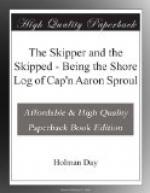Here was the situation: By thrift and shrewd management he had accumulated during his reign nearly enough funds to pay off the town debt and retire interest-bearing notes. He had proposed to make that feat the boast and the crowning point of his tenure of office. He had announced that on a certain day he would have a bonfire of those notes in the village square. After that announcement he had listened for plaudits. What he did hear were resentful growls from taxpayers who now discovered that they had been assessed more than the running expenses of the town called for; and they were mad about it. The existence of that surplus seemed to worry Smyrna. There were many holders of town notes for small amounts, a safe investment that paid six per cent. and escaped taxation. These people didn’t want to be paid. In many cases their fathers had loaned the money to the town, and the safe and sound six per cent. seemed an heirloom too sacred to be disturbed.
Cap’n Sproul’s too-zealous thrift annoyed his townsmen. To have the town owe money made individual debtors feel that owing money was not a particularly heinous offence. To have the town free of debt might start too enterprising rivalry in liquidation.
Therefore, for the first time in his life, Consetena Tate found one of his wild notions adopted, and gasped in profound astonishment at the alacrity of his townsmen. Consetena Tate had unwittingly stumbled upon a solution of that “surplus” difficulty. He wasn’t thinking of the surplus. He was too utterly impractical for that. He was a tall, gangling, effeminate, romantic, middle-aged man whom his parents still supported and viewed with deference as a superior personality. He was Smyrna’s only literary character.
He made golden weddings gay with lengthy epics that detailed the lives of the celebrants; he brought the dubious cheer of his verses to house-warmings, church sociables, and other occasions when Smyrna found itself in gregarious mood; he soothed the feelings of mourners by obituary lines that appeared in print in the county paper when the mourners ordered enough extra copies to make it worth the editor’s while. Added to this literary gift was an artistic one. Consetena had painted half a dozen pictures that were displayed every year at the annual show of the Smyrna Agricultural Fair and Gents’ Driving Association; therefore, admiring relatives accepted Mr. Tate as a genius, and treated him as such with the confident prediction that some day the outside world would know him and appreciate him.
A flicker of this coming fame seemed to dance on Consetena’s polished brow when he wrote a piece for the county paper, heralding the fact that Smyrna was one hundred years old that year.
Mr. Tate, having plenty of leisure to meditate on those matters, had thought of this fact before any one else in town remembered it. He wrote another article urging that the town fittingly celebrate the event. The Women’s Temperance Workers discussed the matter and concurred. It would give them an opportunity to have a tent-sale of food and fancy-work, and clear an honest penny.




